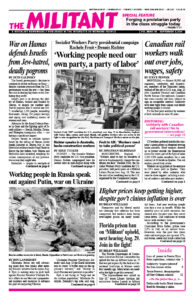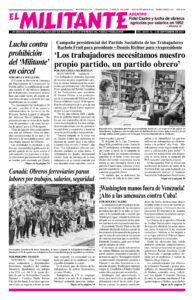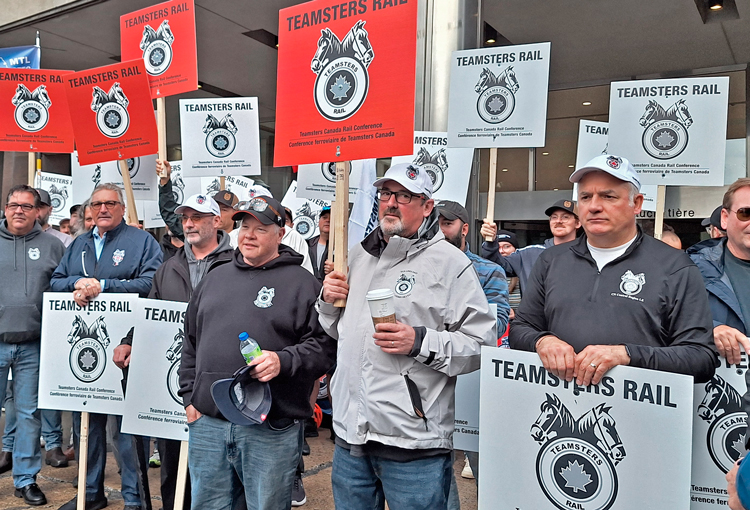Click below for a downloadable pdf of this article
MONTREAL — On Aug. 24, with much of Canada’s freight rail and commuter train system at a standstill following three days of company lockouts and union walkouts, the Canada Industrial Relations Board (CIRB) ordered some 10,000 rail engineers, conductors and dispatchers, members of the Teamsters union, back to work and imposed binding arbitration on them. The ruling removed their democratic right to negotiate the terms of a new contract and strike. It ordered them to return to work by Aug. 26.
The existing contracts which expired last December, under which working conditions have become more and more unsafe and unlivable, remain in effect. The fight against the rail bosses’ profit drive and concession demands that would result in more deaths and injuries on the job – and inevitably more disasters like the 2013 runaway oil train disaster that killed 47 people in LacMégantic, Quebec – is at the center of the conflict.
Paul Boucher, president of Teamsters Canada Rail Conference, the union which represents workers at Canada’s two cross-country railroads — the Canadian National (CN) and Canadian Pacific Kansas City (CPKC) — condemned the decision saying it “sets a dangerous precedent. It signals to Corporate Canada that large companies need only stop their operations for a few hours…and the federal government will step in to break a union….
“The Teamsters have fought to protect rail safety in Canada, improve working conditions, and prevent CN from forcing workers to relocate thousands of kilometers away from their families—and we will continue to do so,” Boucher added.
Canada’s Labour Minister Steven MacKinnon ordered the CIRB to end the walkout less than 17 hours after it began Aug. 22 and impose a contract through binding arbitration. This is exactly what the rail bosses had demanded all along. The labor board’s members are appointed by the government.
After MacKinnon’s announcement the union said the strike against CPKC would continue and issued a 72-hour notice for a strike at CN to begin Aug. 26. Both companies had locked the workers out. However, following the labor board ruling union officials announced they will comply with it while initiating an appeal in a federal court on the basis of the workers’ right to strike.
At a spirited rally in front of CPKC’s headquarters in Calgary the morning before the labor board ruling, Teamsters Canada national president François Laporte insisted workers “have a constitutional right” to strike. Sean O’Brien, international president of the Teamsters, also spoke, denouncing Ottawa’s anti-union attack.
Dustin Saunders, an engineer at CN for 19 years and local chair of the engineer’s division in Vancouver, told the Militant that “CN and CPKC colluded so government would legislate us back to work and impose binding arbitration while presenting concession proposals that are unacceptable.”
“The labor board’s ruling, on behalf of the anti-labor Trudeau government, is an attack on the right of the unions to negotiate wages and working conditions and to strike to defend and improve them against boss and government assaults,” CN rail conductor and Teamsters picket captain Philippe Tessier told the Militant.
“Our union rapidly won broad support from unions across Canada as well as in the U.S. and the U.K. who understand the importance of our fight for rail safety and livable working schedules and defense of fundamental union and working-class rights.”
Broad solidarity with rail workers’ fight
The Teamsters have received solidarity messages and support from the Brotherhood of Locomotive Engineers and Trainmen in the U.S., the International Longshore and Warehouse Union, UNIFOR, the Confederation of National Trade Unions, the Quebec Division of the Public Service Alliance of Canada, the British Columbia Federation of Labour, SMART-TD, the largest rail union in the U.S., including locals that represent workers in Ohio, Pennsylvania and Illinois; and the Manchester, U.K., branch of the Associated Society of Locomotive Engineers and Firemen.
“[T]here is a growing frustration among workers due to rising cost of living, economic inequities and lack of safety on the job,” Lana Payne, National President of the Unifor union, said in a public statement of support to the rail workers before the CIRB ruling was announced. The railways “have publicly campaigned against fair and free collective bargaining and workers’ constitutional right to strike.’’
When the labour minister announced the government action against the strike, reporters asked what had changed since his announcement just days earlier that Ottawa had rejected the rail companies call to impose compulsory arbitration.
MacKinnon said that the economic impact of the walkout “cannot be understated.” The government action was necessary, he argued, to “secure industrial peace” and protect Canadian capitalism’s reputation as a reliable trading partner.
Business organizations across the country had been clamoring for government intervention to end the walkout. Canada’s railroads transport $1 billion Canadian ($735 million U.S.) worth of goods daily, including half the country’s exports.
“Labour disputes stretching from North America to India are threatening a new wave of disruptions to US supply chains after rail workers in Canada stopped working on Thursday,” the Financial Times wrote. “Freight groups are warning that the work stoppage at Canada’s two biggest railroad operators could be followed by a strike at ports on the US East Coast in the coming weeks, leaving West Coast ports overwhelmed.”
Under these circumstances, MacKinnon said the government had decided to use their powers to “skirt the collective bargaining process.” New Democratic Party leader Jagmeet Singh denounced the government’s action as “anti-worker.” The Conservative opposition has remained silent.
“No one should be surprised by the Trudeau Liberal government’s latest attack on the fundamental rights of working people and our unions,” Katy LeRougetel, Communist League candidate in the Sept. 16 federal byelection in Lasalle-Ville Emard-Verdun told the Militant.
“In February 2022 Ottawa invoked the draconian Emergencies Act against truckers in Ottawa protesting job-threatening vaccine mandates, deploying over 3,000 heavily armed police in one of the largest acts of government repression in Canadian history, arresting and imposing frame-up criminal charges on many protest leaders and participants. In April 2021 they ordered striking longshore workers at the Port of Montreal back to work and imposed compulsory arbitration on them. “Whatever their differences, all of the political parties in Ottawa and the provinces defend the class interests of the bosses, not working people who create all of society’s wealth,” said LeRougetel, an industrial bakery worker and union member.
“The most important lesson of this major class battle is that working people need a party of our own — a mass party of labor to mobilize the solidarity of working people in the streets and on picket lines, in defense of the rights of workers in struggle like the rail workers, along the road to replacing the government of the ruling rich with a workers government.”
“The rail workers’ struggle for rail safety and in defense of union rights will continue. They will need the solidarity of the union movement and working people everywhere.”


